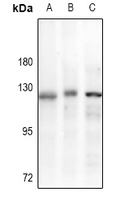Product Name :
p130 Cas polyclonal antibody Background :
p130 Cas (Crk-associated substrate) is a docking protein containing multiple protein-protein interaction domains. The amino-terminal SH3 domain may function as a molecular switch regulating CAS tyrosine phosphorylation, as it interacts with focal adhesion kinase (FAK) and the FAK-related kinase PYK2 , as well as the tyrosine phosphatases PTP-1B and PTP-PEST . The carboxy-terminal Src binding domain (SBD) contains a proline-rich motif that mediates interaction with the SH3 domains of Src-family kinases (SFKs) and a tyrosine phosphorylation site (Tyr668 and/or Tyr670) that can promote interaction with the SH2 domain of SFKs . The p130 Cas central substrate domain, the major region of tyrosine phosphorylation, is characterized by 15 tyrosines present in Tyr-X-X-Pro (YXXP) motifs, including Tyr165, 249, and 410. When phosphorylated, most YXXP motifs are able to serve as docking sites for proteins with SH2 or PTB domains including adaptors, C-Crk, Nck, and inositol 5'-phosphatase 2 (SHIP2) . The tyrosine phosphorylation of p130 Cas has been implicated as a key signaling step in integrin control of normal cellular behaviors including motility, proliferation, and survival. Aberrant Cas tyrosine phosphorylation may contribute to cell transformation by certain oncoproteins. Product :
Liquid in 0.42% Potassium phosphate, 0.87% Sodium chloride, pH 7.3, 30% glycerol, and 0.01% sodium azide. Storage&Stability :
Store at 4°C short term. Aliquot and store at -20°C long term. Avoid freeze-thaw cycles. Specificity :
Recognizes endogenous levels of p130 Cas protein. Immunogen :
KLH-conjugated synthetic peptide encompassing a sequence within the center region of human p130 Cas. The exact sequence is proprietary. Conjugate :
Unconjugated Modification :
Unmodification
p130 Cas polyclonal antibody Background :
p130 Cas (Crk-associated substrate) is a docking protein containing multiple protein-protein interaction domains. The amino-terminal SH3 domain may function as a molecular switch regulating CAS tyrosine phosphorylation, as it interacts with focal adhesion kinase (FAK) and the FAK-related kinase PYK2 , as well as the tyrosine phosphatases PTP-1B and PTP-PEST . The carboxy-terminal Src binding domain (SBD) contains a proline-rich motif that mediates interaction with the SH3 domains of Src-family kinases (SFKs) and a tyrosine phosphorylation site (Tyr668 and/or Tyr670) that can promote interaction with the SH2 domain of SFKs . The p130 Cas central substrate domain, the major region of tyrosine phosphorylation, is characterized by 15 tyrosines present in Tyr-X-X-Pro (YXXP) motifs, including Tyr165, 249, and 410. When phosphorylated, most YXXP motifs are able to serve as docking sites for proteins with SH2 or PTB domains including adaptors, C-Crk, Nck, and inositol 5'-phosphatase 2 (SHIP2) . The tyrosine phosphorylation of p130 Cas has been implicated as a key signaling step in integrin control of normal cellular behaviors including motility, proliferation, and survival. Aberrant Cas tyrosine phosphorylation may contribute to cell transformation by certain oncoproteins. Product :
Liquid in 0.42% Potassium phosphate, 0.87% Sodium chloride, pH 7.3, 30% glycerol, and 0.01% sodium azide. Storage&Stability :
Store at 4°C short term. Aliquot and store at -20°C long term. Avoid freeze-thaw cycles. Specificity :
Recognizes endogenous levels of p130 Cas protein. Immunogen :
KLH-conjugated synthetic peptide encompassing a sequence within the center region of human p130 Cas. The exact sequence is proprietary. Conjugate :
Unconjugated Modification :
Unmodification
-
 Western blot analysis of p130 Cas expression in rat testis (A), Beas2B (B), A549 (C) whole cell lysates.
Western blot analysis of p130 Cas expression in rat testis (A), Beas2B (B), A549 (C) whole cell lysates.
Bioworld Biotech only provide peptides for our antibodies and do not provide additional peptide customization services.
Price/Size :
USD 368/1mg/vial
Tips:
For phospho antibody, we provide phospho peptide(0.5mg) and non-phospho peptide(0.5mg).Describe :
Blocking peptides are peptides that bind specifically to the target antibody and block antibody binding. These peptide usually contains the epitope recognized by the antibody. Antibodies bound to the blocking peptide no longer bind to the epitope on the target protein. This mechanism is useful when non-specific binding is an issue, for example, in Western blotting (WB) and Immunohistochemistry (IHC). By comparing the staining from the blocked antibody versus the antibody alone, one can see which staining is specific; Specific binding will be absent from the western blot or IHC performed with the neutralized antibody.Formula:
Synthetic peptide was lyophilized with 100% acetonitrile and is supplied as a powder. Reconstitute with 0.1 ml DI water for a final concentration of 10 mg/ml.The purity is >90%,tested by HPLC and MS.
Storage:
The freeze-dried powder is more stable. For short time at 2-8°C. For long term storage store at -20°C.
Note :
This product is for research use only (RUO only). Not for use in diagnostic or therapeutic procedures.
 p130 Cas polyclonal antibody
p130 Cas polyclonal antibody  Datasheet
Datasheet COA
COA MSDS
MSDS SHIP
SHIP